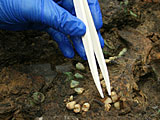Archaeology and Palaeogenetics
DGUF Annual Meeting, 9 to 12 May 2013 in Erlangen (Germany)
In the past 20 years, archeology has won the palaeogenetics as neighbouring science that has catapulted the possibilities of analysis and interpretation of human and animal skeletons to new levels. However, at the same time we observe in no other field except the palaeogenetics such radical changes of course leaving confusion and misunderstanding among archaeological experts and in the public.
In the past 20 years, archeology has won the palaeogenetics as neighbouring science that has catapulted the possibilities of analysis and interpretation of human and animal skeletons to new levels. However, at the same time we observe in no other field except the palaeogenetics such radical changes of course leaving confusion and misunderstanding among archaeological experts and in the public.
Go to ...
Conference programme (PDF)
Archäologie und Paläogenetik. DGUF-Tagung vom 9.-12. Mai 2013, Erlangen
Archäologie und Paläogenetik. DGUF-Tagung vom 9.-12. Mai 2013, Erlangen
Past DGUF Annual Meetings
From an archaeological point of view, questions about human evolution, population dynamics as well as about domestication research are burning issues. For that purpose, palaeogenetics has provided numerous new methods, facts and interpretation models within a few years. The DGUF-conference 2013 “Archaeology and Palaeogenetics” aims to comprehend and penetrate the current state of research and to present valid methods, results and their historical consequences. Furthermore, we want to be able to relate better to internal discussions and divergencies as well as to agreements and disputes between archaeology and palaeogenetics.
Keynote Speakers
In terms of key lectures on anthropology and palaeogenetics we welcomed Dr. Ruth Bollongino (Mainz), Prof. Dr. Joachim Burger (Mainz) and Prof. Dr. Katerina Harvati (Tübingen). Prof. Dr. Jens Lüning (Cologne), PD Dr. Frank Siegmund (Düsseldorf) and Prof. Dr. Gerd-Christian Weniger (Mettmann) gave overviews concerning the archaeological discussion of the main topics - human evolution, population dynamics and domestication.
Publication of papers
The results of the conference are published in the journal "Archäologische Informationen" (vol. 37, 2014) and accessible as Open Access publication.
The annual conference took place in the premises of the Friedrich-Alexander-University Erlangen. On location, DGUF was significantly supported by our co-operation partner, the Institute for Prehistory and Early History Erlangen (Prof. Dr. T. Uthmeier and team).
Keynote Speakers
In terms of key lectures on anthropology and palaeogenetics we welcomed Dr. Ruth Bollongino (Mainz), Prof. Dr. Joachim Burger (Mainz) and Prof. Dr. Katerina Harvati (Tübingen). Prof. Dr. Jens Lüning (Cologne), PD Dr. Frank Siegmund (Düsseldorf) and Prof. Dr. Gerd-Christian Weniger (Mettmann) gave overviews concerning the archaeological discussion of the main topics - human evolution, population dynamics and domestication.
Publication of papers
The results of the conference are published in the journal "Archäologische Informationen" (vol. 37, 2014) and accessible as Open Access publication.
The annual conference took place in the premises of the Friedrich-Alexander-University Erlangen. On location, DGUF was significantly supported by our co-operation partner, the Institute for Prehistory and Early History Erlangen (Prof. Dr. T. Uthmeier and team).

